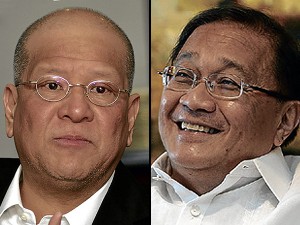Pangilinan, Ang absence on PH billionaires’ list questioned

MOVERS AND SHAKERS. Ramon S. Ang and Manny V. Pangilinan are conspicuously missing from Forbes magazine’s list of Filipino billionaires.
Amid the annual who’s-in-who’s-out hubbub created by the release of the Forbes list, two very prominent names in the local and regional business scenes were—to many observers—incredibly absent from the Philippine billionaires’ roster.
Nowhere to be found on the list of the country’s 40 richest individuals are tycoons Ramon S. Ang (RSA) and Manuel V. Pangilinan (MVP) who have been engaged in recent years in a friendly (they claim) competition to outdo each other in buying up whatever company is for sale, both here and abroad.
Pangilinan heads the giant PLDT group that has interests in telecommunications (PLDT, Smart, Sun), infrastructure and tollways (Metro Pacific Investments Corp.), mining (Philex), and utilities (Meralco, Maynilad), media (TV5), among others.
Ang heads San Miguel—the country’s largest conglomerate by market value—which has interests in the food and beverage business (San Miguel Beer, Purefoods), airlines (Philippine Airlines), tollways and infrastructure (SLEx, Skyway, Boracay airport), telecommunications (Wi-Tribe) and property development (San Miguel Properties), oil (Petron), among other businesses.
‘Mere employees?’
Article continues after this advertisementThe common explanation for the absence of “RSA” and “MVP”—as both men are known in the business community—from the Forbes list year in and year out is the fact that both men, as heads of their respective conglomerates, are “mere employees.”
Article continues after this advertisementBut interviews made by the Inquirer with business associates and longtime observers of the dynamics of Philippine business reveal that the absence of both corporate titans, indeed, exposes one of the biggest weaknesses of the celebrated roster.
“Mere employees? Nothing can be further than the truth,” said one businessman familiar with the corporate structures of Ang’s San Miguel Corp. and Pangilinan’s PLDT group.
‘Very high’ on list
“For the list to be accurate, they should be high on the Top 40 list of Filipino billionaires,” said the businessman, requesting anonymity. “Very high.”
He explained that both Ang and Pangilinan had, in fact, “very creative methods” of keeping their wealth from public view, including structuring their ownership in various corporations through several layers of ownership in holding companies.
“If you were to pierce the veil of ownership in the various firms they work for, you will find that they actually have bigger stakes than what people think,” he said. “It’s not illegal, just creative.”
Surging taipans
Meanwhile, observers have also noticed the growing number of Chinese-Filipino taipans and would-be taipans on the Forbes list in recent year, gradually easing out the Spanish mestizo families that have dominated the local business scene over the last century.
The 2012 edition of the Forbes billionaires’ list, in fact, only has four Spanish mestizo families or businessmen, compared to at least 24 Chinese mestizo families or businessmen.
“Since I started working, Chinese-Filipinos have always wanted to beat San Miguel,” said business consultant and investment banker Eric Filamor, referring to San Miguel’s origins under the Zobel and later, Soriano families.
“[The Chinese-Filipinos] took on the biggest challenges and did not mind losing along the way,” he added. “They also ignored the many insults and hurts.”
Indeed, the most aggressive groups in the local business scene of late have been the likes of Henry Sy Sr.’s SM group, the Ang-controlled San Miguel, airline and mall magnate John Gokongwei Jr. and property tycoon Andrew Tan.
In contrast, the flagship firm of the Zobel family—Ayala Corp.—has opted to maintain its tried and tested conservative business practices, serving it well for over a century.
Amid all this, there are some people on the Forbes list who are actually not pleased to see their names on it.
Forbes’ method hit
One such person is Petron Corp. president Eric Recto who, for the second year in a row, is protesting his inclusion on the list.
Valued at $365 million by Forbes and ranked 24 on the list, Recto said Forbes’ method was inherently flawed because the magazine counts only people’s assets, and excludes liabilities “which they have no way of finding out.”
“I’ve written them already to point this out,” he said in an interview with the Inquirer, explaining that Forbes’ rankings are mainly based on the valuation of stocks that the tycoons own—a method that he calls “simplistic” since it fails to capture personal assets as well as personal loans, or the circumstances of business concerns that are not listed on stock exchanges.
“Let’s put it this way: If you took away $300 million from that $365 million I’m supposed to be worth, I’d already be ecstatic,” he said.